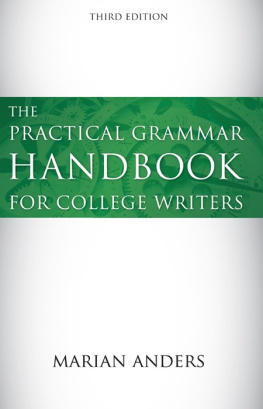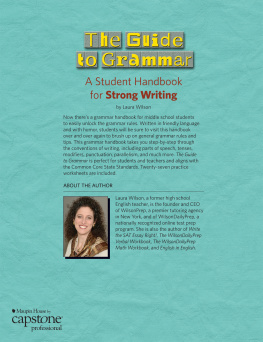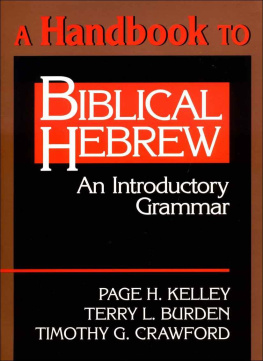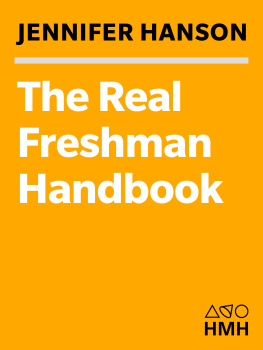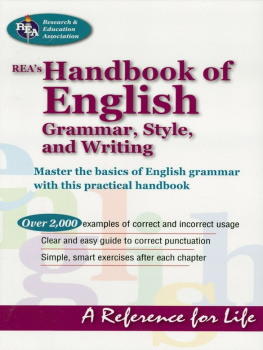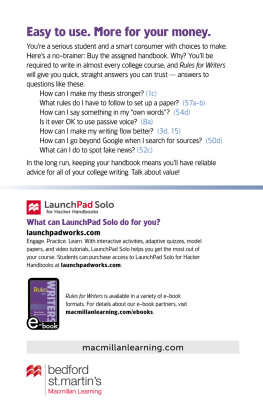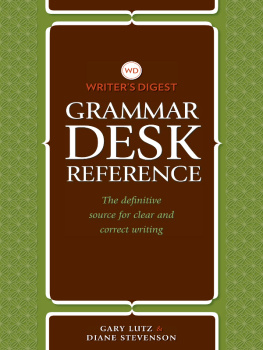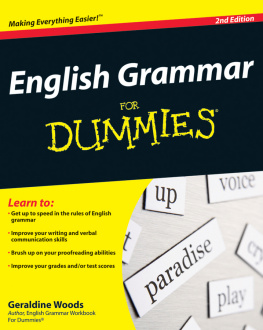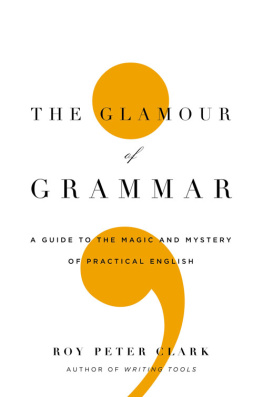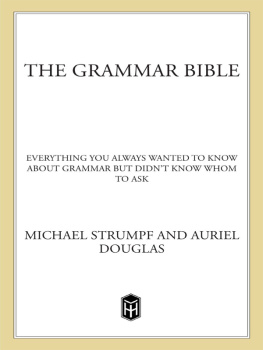Marian Anders - The Practical Grammar Handbook for College Writers
Here you can read online Marian Anders - The Practical Grammar Handbook for College Writers full text of the book (entire story) in english for free. Download pdf and epub, get meaning, cover and reviews about this ebook. year: 2017, publisher: Carolina Academic Press, genre: Detective and thriller. Description of the work, (preface) as well as reviews are available. Best literature library LitArk.com created for fans of good reading and offers a wide selection of genres:
Romance novel
Science fiction
Adventure
Detective
Science
History
Home and family
Prose
Art
Politics
Computer
Non-fiction
Religion
Business
Children
Humor
Choose a favorite category and find really read worthwhile books. Enjoy immersion in the world of imagination, feel the emotions of the characters or learn something new for yourself, make an fascinating discovery.
- Book:The Practical Grammar Handbook for College Writers
- Author:
- Publisher:Carolina Academic Press
- Genre:
- Year:2017
- Rating:4 / 5
- Favourites:Add to favourites
- Your mark:
- 80
- 1
- 2
- 3
- 4
- 5
The Practical Grammar Handbook for College Writers: summary, description and annotation
We offer to read an annotation, description, summary or preface (depends on what the author of the book "The Practical Grammar Handbook for College Writers" wrote himself). If you haven't found the necessary information about the book — write in the comments, we will try to find it.
The Practical Grammar Handbook for College Writers — read online for free the complete book (whole text) full work
Below is the text of the book, divided by pages. System saving the place of the last page read, allows you to conveniently read the book "The Practical Grammar Handbook for College Writers" online for free, without having to search again every time where you left off. Put a bookmark, and you can go to the page where you finished reading at any time.
Font size:
Interval:
Bookmark:
Practical Grammar Handbook
for College Writers
Practical Grammar Handbook
for College Writers
Third Edition
Marian Anders

CAROLINA ACADEMIC PRESS
Durham, North Carolina
Copyright 2017
Marian Anders
All Rights Reserved
Library of Congress Cataloging-in-Publication Data
Names: Anders, Marian, author.
Title: The practical grammar handbook for college writers / Marian Anders.
Description: Third edition. | Durham, North Carolina : Carolina Academic Press, 2017. | Includes bibliographical references and index.
Identifiers: LCCN 2017025427 | ISBN 9781531005436 (alk. paper)
Subjects: LCSH: English language--Grammar. | English language--Rhetoric. | Report writing.
Classification: LCC PE1112 .A54 2017 | DDC 428.2--dc23
LC record available at https://lccn.loc.gov/2017025427
Carolina Academic Press, LLC
700 Kent Street
Durham, NC 27701
Telephone (919) 489-7486
Fax (919) 493-5668
www.cap-press.com
Printed in the United States of America
As a student, I always enjoyed English, but I never understood grammar. I had a natural talent for language and writing, so I got good grades on my papers without knowing what I was doing.
I began learning grammar when I was working on my Master's degree in English at Florida State University. When I became a teacher and saw my students getting frustrated by the traditional approach to learning grammar, I developed a more practical approach which presents the material step-by-step and provides a variety of tricks for students to use.
I have taught English grammar, composition, and literature to college freshmen and sophomores for over twenty years, and the methods presented in this handbook work for all kinds of students, those who love writing and those who find it difficult. These methods work because they are based on logic rather than intuition or memorization.
My students have told me, I always hated English, but this isn't too bad, and I never understood grammar before, but this method makes it easy. The Practical Grammar Handbook for College Writers focuses on what you need to know and explains everything quickly and clearly. Grammar may never be your favorite subject, but it doesn't have to be a mystery or a misery.
Marian Anders
Marian Anders earned a Master of Arts degree in English from Florida State University. She has over twenty-five years' experience teaching all levels of grammar and composition, from basic skills developmental to advanced college grammar. She teaches English at Alamance Community College in Graham, North Carolina.
I offer my thanks to the many English teachers I have had the privilege of working with over the years. By sharing ideas and supporting each other, we have all become better teachers. I especially thank Jeannie Murphy, my friend and mentor from Pierce College who taught me the intricacies of traditional grammar, and Nancy Bolle, also from Pierce College, who was a supportive friend when I was a new teacher.
Abundant thanks also to my family for their invaluable support.
This book is dedicated to all my studentspast, present, and future.

M ost people have learned to find the subject of a sentence by asking, What is the sentence about? To find the verb, most people have been told, Look for an action word. Sometimes that method works, but often it doesn't.
She enjoys baking brownies.
What is this sentence about? Most people would say brownies. What is the action word? Most people would say baking. But the subject of this sentence is not brownies; it's she. And the verb is not baking; it's enjoys.
In this chapter you will learn to find the verb first and then the subject by using a method that always works.
Take your time on this chapter because everything you need to know about grammar builds on your ability to find the verb and the subject.
Most people were taught to find the verb in a sentence by looking for the action word. Sometimes that method works, but other times it doesn't. The time change method is much easier to use, and it always works.
Change the time of the sentence by saying yesterday, every day, and tomorrow at the beginning of the sentence. When you change the time of the sentence, the verb will change automatically.
Listen for the word that changes when you change the time. That word is the verb.
Yesterday Steve ATE a pizza. (past)
Every day Steve EATS a pizza. (present)
Tomorrow Steve WILL EAT a pizza. (future)
Yesterday Jill BOUGHT a new pair of shoes.
Every day Jill BUYS a new pair of shoes.
Tomorrow Jill WILL BUY a new pair of shoes.
Try these sentences on your own and then check your answers below.
My dog bites the English teacher.
Yesterday My dog ...
Every day My dog ...
Tomorrow My dog ...
Here are the answers:
Yesterday My dog BIT the English teacher.
Every day My dog bites the English teacher. (no change)
Tomorrow My dog WILL BITE the English teacher.
In the every day sentence, nothing changed because the original sentence was already in the present. The verb changes when you change the time. The word bites changed, so bites is the verb.
Now try this one and check your answers below:
My brother Charlie got a flat tire.
Yesterday My brother Charlie ...
Every day My brother Charlie ...
Tomorrow My brother Charlie ...
Here are the answers:
Yesterday My brother Charlie got a flat tire. (no change)
Every day My brother Charlie GETS a flat tire.
Tomorrow My brother Charlie WILL GET a flat tire.
This time the yesterday sentence didn't change because the original sentence was already in the past. The word got changed, so got is the verb.
When you change the time to find the verb, use all three time words; the verb will change with two of them.
Getting tricky...
You may have heard the terms action verb, linking verb, and helping verb.
For practical grammar, all that matters is, Does this sentence have a verb, yes or no? Changing the time always works for finding every kind of verb.
If you want to learn more, turn to Types of Verbs on .
Let's try some tricky sentences. Remember, don't look for the verb. Listen for the word that changes.
Jackie loves playing volleyball.
Yesterday Jackie LOVED playing volleyball.
Every day Jackie loves playing volleyball.
Tomorrow Jackie WILL LOVE playing volleyball.
The word that changed is loves, so loves is the verb.
Are you surprised that playing wasn't the verb? Playing looks like an action word, but it did not change when we changed the time. The real verb will always change.
Getting tricky...
If playing isn't the verb, what is it?
Playing is a direct object. See for an explanation of direct objects.
Try finding the verb in these sentences and then check your answers below:
Font size:
Interval:
Bookmark:
Similar books «The Practical Grammar Handbook for College Writers»
Look at similar books to The Practical Grammar Handbook for College Writers. We have selected literature similar in name and meaning in the hope of providing readers with more options to find new, interesting, not yet read works.
Discussion, reviews of the book The Practical Grammar Handbook for College Writers and just readers' own opinions. Leave your comments, write what you think about the work, its meaning or the main characters. Specify what exactly you liked and what you didn't like, and why you think so.

